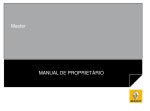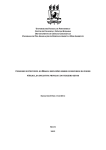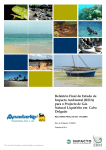Download Office of the Director of Public Prosecutions E
Transcript
Office of the Director of Public Prosecutions E-Newsletter Issue 39 August 2014 ‘To No One Will We Sell, To No One Deny or Delay Justice’ Chapter 40, Magna Carta 1215 August 2014- Issue 39 IN THIS ISSUE: Editorial Pg 2 Sexting – Learning to close the gap Pg 3 Le droit à l’oubli Pgs 4-6 Combatting trans-national organised crime at sea Pg 7 Expert Meeting on Transnational Organized Crime in East Africa Zanzibar, Tanzania Pg 8 Ecole Nationale de la Magistrature La Convention Européenne Des Droits de L’homme : Mode D’emploi Pg 9 UNDOC Botswana Conference: Recovering the Proceeds from Wildlife and Timber Crimes-Asian and African experiences Pgs 10-11 Distribution de “ Tanya so zistwar” à Cité Anoska Pg 12 Le dernier des géants est parti Pgs 13-14 Case Summary Pgs 15-18 EDITORIAL TEAM Mrs Zaynah Essop, State Counsel Mr Ashley Victor, Public Relations Officer Mr Nitish Bissessur, LRO Mr Toshan Rai Bundhun, LRO Mr Yashvind Kumar Rawoah, LRO Mr Ajmal Toofany, LRO We look forward to hear about your comments/suggestions on: [email protected] Page 1 August 2014- Issue 39 EDITORIAL Dear Readers, Welcome to the August 2014 issue in which we provide you with an insight into the events and activities of the Office. Mr Satyajit Boolell SC, DPP, discusses the issue of ‘sexting’ among teenagers and the need for police officers to become more familiar with technology so as to tackle such crime. On the other hand, Mr Ajmal Toofany, Legal Research Officer, makes an analysis of the right to be forgotten and the right to privacy of an individual. Some of our officers have attended several training during the past month. Among the subjects discussed are: (a) trans-national crimes at sea; (b) recovering the proceeds from wildlife and timber crimes; and (c) the application of the European Convention on Human Rights. Following the invitation from the student union of the Mauritian branch of the University of Wolverhampton, two of our officers distributed forty copies of ‘Tanya so Zistwar’ to members of the NGO ‘Mouvement d’Aide à la Maternité’ at Cité Anoska, Forest Side. Mr Jean Roger Boodhna, OSK, pays tribute to late Mr Robert Ahnee, former judge. Finally, we provide you with a summary of the latest Supreme Court judgments. We wish you a pleasant reading. Zaynah Essop State Counsel Page 2 Sexting - Closing the learning gap August 2014- Issue 39 Sexting occurs when individuals share explicit images of themselves over the mobile phones or across social networks. It is common, almost a trend for our teenagers, especially girls, to send explicit photos of themselves to their boyfriends. If the relationship turns sour, as is often the case, the explicit photograph is circulated to school / college friends or simply posted on a social media page online. Sexting is a serious offence. It is a breach of section 46(h) of the Information and Communication Technologies Act (ICTA) which provides that any person who uses an information and communication service, including telecommunication service for the transmission or reception of a photograph which is indecent, commits an offence and shall on conviction be liable to a fine not exceeding one million rupees and to imprisonment for a term not exceeding 5 years. Similarly under Section 15 of the Child Protection Act, it is an offence visited by a fine not exceeding twenty-five thousand rupees and imprisonment up to twenty years for a person who distributes or has in his possession an indecent photograph of a child, defined as a person under the age of eighteen, with a view to distribution. If cases of sexting are seldom reported because of the attached social stigma, cases of insults and other forms of abuses online are on the other hand reported more often and on the rise. We may not know the size of the problem facing us yet but it is not uncommon these days for many young persons to use facebook or twitter to bully, insult, threat, harass and make all kinds of threats. This antisocial behavior, unknown to many also constitutes a crime under section 46 (h) of the ICTA. The police will certainly be inundated with complaints relating to online crimes as technology penetrates deeper in all layers of society. They will have to prepare themselves for a culture change, by becoming more tech savvy police officers The new recruits will certainly learn faster but they will lack the experience of seasoned enquiring officers. The challenge is to close the learning gap fast. Satyajit Boolell SC DPP Page 3 August 2014- Issue 39 Le droit à l’oubli Seize ans après avoir fait l’objet d’une annonce dans un journal local, un ressortissant européen constata que lorsqu’un internaute introduisait son nom dans le moteur de recherche du groupe Google, ce dernier affichait toujours des liens vers les pages du journal, révélant ainsi des données relatives à sa personne. En 2010 le ressortissant introduisit auprès de l’Agence Espagnole de Protection des Données (AEPD) une réclamation à l’encontre de l’éditeur du journal ainsi qu’à l’encontre de Google Spain et de Google Inc. afin que ces derniers prennent les mesures nécessaires pour supprimer ses données personnelles apparaissant sur les résultats de recherche. L’AEPD rejeta la réclamation dirigée contre l’éditeur en estimant que les informations avaient été publiées légalement mais accueilli la demande concernant Google Spain et Google Inc. en ordonnant à ces derniers de retirer les données de leur index et de rendre l’accès impossible à l’avenir. Par conséquent, Google Spain et Google Inc. introduisirent deux recours en annulation de la décision devant la juridiction nationale (Audience Nationale, Espagne). La juridiction nationale défera des questions préjudicielles à la Cour de Justice de l’Union Européenne (CJUE) portant sur l’interprétation de certaines dispositions de la ‘Directive 95/46CE du 24 Octobre 1995 relative à la protection des personnes physiques à l’égard du traitement des données à caractère personnel et à la libre circulation de ces données’ ainsi que de l’article 8 de la ‘Charte des droits fondamentaux de l’Union Européenne’. La CJUE estima qu’en vertu de la Directive, une personne concernée peut prétendre à la suppression des liens vers des pages web sur la liste des résultats au motif qu’elle souhaiterait que les informations y figurant relatives à sa personne soient « oubliées » après un certain temps. Selon la Cour, toute incompatibilité avec la Directive justifie l’effacement des informations et des liens figurant dans la liste de recherche. La Cour considère que « eu égard à l’ensemble des circonstances, les données en questions apparaissent inadéquates, pas ou plus pertinentes ou excessives au regard des finalités pour lesquelles elles ont été traitées et du temps qui s’est écoulé ». Cependant le principe n’est pas absolu car ce droit à l’oubli est apprécié à la lumière du droit à l’information du public, de l’intérêt économique de l’exploitant du moteur, du droit au respect de la vie privée et le droit à protection de données à caractère personnel. La CJUE précisa que la recherche d’un équilibre peut dépendre de la nature de l’information en question, de sa sensibilité pour la vie privée ainsi que de l’intérêt du public à recevoir cette information, notamment en fonction du rôle joué par la personne dans la vie publique. La garantie du droit à l’effacement de ses données qui figure à l’article 12 (b) de la Directive 95/46CE, a été renforcée par la décision de la CJUE qui est venue étoffer le control de conformité de la Directive à l’égard des Page 4 August 2014- Issue 39 responsables de traitement de données. En sus de l’exactitude des données (qui a trait à la véracité de l’information), la conformité à la Directive requiert que les données traitées soient « adéquates, pertinentes et non-excessives eu égard aux finalités du traitement ». La Cour qualifie ces critères en spécifiant que « l’inadéquation et la nonpertinence» se concrétisent par « l’absence de mise à jour » tandis que « l’excessivité » quant à elle se matérialise par une « conservation excédant une durée nécessaire ». Dans la lignée de son raisonnement, la Haute Juridiction prend en considération le « temps qui s’est écoulé ». En l’espèce une publication effectuée 16 ans auparavant justifie à ce que ces informations ne soient plus liées par le nom de la personne au moyen d’une liste. La durée de la conservation n’est pas prise en considération lorsque cette dernière est faite à des fins historiques, statistiques ou scientifiques. Ainsi l’incompatibilité se mesure dans les faits eus égard à la nature de l’information, dans son aspect utilitaire et temporel, ainsi qu’à l’égard de la finalité de son usage. Ces informations doivent par conséquent faire l’objet d’un traitement. L’apport de la Cour en la matière a trait à l’interprétation de l’article 2(b) relative à la notion de « traitement de données à caractère personnel ». Aux conditions énumérées à l’article ci-dessus, la Cour, après l’analyse de l’activité du moteur de recherche, vient ajouter que la recherche, l’indexation, le stockage et la mise à disposition de l’information constitue un traitement au sens de la Directive. Les termes utilisés pour qualifier l’activité du moteur de recherche correspondent aux termes de l’article 2(b) dans le sens ou la recherche est assimilée à la collecte, l’indexation à l’organisation et le stockage à la conservation (sachant que la mise à disposition figurant déjà au titre de l’article 2(b)). La Cour dit pour droit que le fait de (1.) trouver des informations publiées ou placées sur Internet par des tiers ; (2.) d’indexer ces informations de manière automatique ; (3.) de stocker ces informations temporairement et de (4.) mettre à la disposition des internautes ces informations selon un ordre de préférence donné, constituent un « traitement de données à caractère personnel ». En se prononçant de la sorte, on est en mesure d’observer que la décision accorde certaines particularités à la manière de traiter l’information. On retrouve des lors le caractère « temporaire » du stockage et une mise à disposition calqué sur un « ordre préférentiel ». Chaque traitement de données doit faire l’objet d’une légitimation en vertu de l’article 7(f) de la Directive. Cette légitimation commande de garantir que les droits et libertés fondamentaux prévalent sur l’intérêt légitime poursuivi par le responsable du traitement. A ce titre, les droits fondamentaux qui figurent aux articles 7 et 8 de la Charte de l’Union Européenne font office de protection contre toute ingérence dans la vie privée et une protection à l’égard de données à caractère personnel. En l’espèce la Cour n’hésita pas à affirmer que l’intérêt économique poursuivi par l’exploitant n’est pas en mesure d’autoriser ni une atteinte à la vie privée ni une atteinte à la protection des données à Page 5 August 2014- Issue 39 caractère personnel. Cette ingérence a aussi été appréciée eu égard au caractère « sensible » de l’information. Ainsi, dans les faits, il fut considéré qu’une «vente aux enchères immobilière liée à une saisie pratiquée aux fins du recouvrement de dettes en matière de sécurité sociale», constitue une « information sensible » eu égard à la vie privée. La particularité de la décision tient à l’élargissement octroyé à l’article 7(f). Pour la Cour, le droit au respect de sa vie privée et à la protection des données à caractère personnel fait échec non seulement à l’intérêt économique mais également au droit à l’information du public. Conséquemment le droit à l’information du public ne justifierait pas une violation des droits fondamentaux prévus par les articles 7 et 8 sauf si le rôle joué par la personne dans la vie publique est justifiée par l’intérêt prépondérant du public à avoir accès à l’information. En l’espèce, il n’existait pas de raisons particulières justifiant un tel intérêt. Avec l’interprétation protectionniste accordée à l’article 7 (f), le droit de s’opposer au traitement de données en vertu de l’article 14(a) de la Directive 95/46CE, fait l’objet d’une application plus efficace. Le droit à l’oubli, fraichement consacré par la Jurisprudence de la CJUE, constitue ce droit à ce que l’information relative à sa personne ne soit plus liée à son nom par une liste de résultats affichée à la suite d’une recherche effectuée à partir de son nom. La CJUE a facilité l’exercice de ce droit en lui enlevant toute subordination à l’établissement d’un « préjudice ». Cette approche démontre à la fois une volonté protectionniste et préventive qui tend à rejoindre la philosophie ayant entrainé l’adoption de la Directive. Ce droit incombe parallèlement une obligation à l’exploitant de moteur de recherche qui est tenu de supprimer de la liste de résultats, affichée à la suite d’une recherche effectuée à partir du nom d’une personne, des liens vers des pages web, publiées par des tiers et contenant des informations relatives à cette personne. Dans un élan de faciliter l’exercice du droit à l’oubli et l’obligation de suppression, la Cour affirme que ni l’absence de suppression préalable ou simultané des informations des pages web ni la licéité de la publication sur ces pages, peuvent faire obstacle à une revendication de supprimer ces liens. Ajmal Toofany Legal Research Officer Page 6 Combatting Transnational Organised Crime at Sea August 2014- Issue 39 The response of the international community to the problems caused by Somali pirates in the Indian Ocean has been to set up a voluntary ad hoc organisation called the Contact Group on Piracy off the Coast of Somalia (CGPCS). Participation in the work of the CGPCS is open to any State; and there are five working groups which co-ordinate action in a particular area such as capacity building or the military approach against the pirates. There is another working group under the leadership of Italy to deal with the money laundering aspect of the problem. On 21st and 22nd May the European Union (EU) and Interpol hosted a workshop in Brussels, Belgium on the theme of chasing the money trail. The workshop was attended by nearly 150 representatives from more than twenty States and bodies who work in the fields of law enforcement and financial intelligence. There were also representatives from the private sector. There has been, since the year 2012, a marked drop in the activities of Somali pirates at sea especially because of the effectiveness of the naval task force, Operation Atalanta, which is headed by the EU. However, the problem of piracy cannot be viewed simply as preventing pirates from operating. Looking beyond the level of the foot-soldier, there are kingpins and masterminds busy at work. In a comprehensive exposé, Mr Henny Bakker, a senior financial investigator from the financial intelligence unit in Holland, showed that just as the acts of piracy were beginning to decrease there was a significant increase in the amount of money transfers from Somalia to Holland with bogus transactions to camouflage the tainted origins of the inflows. Other speakers talked about the transnational aspect of Somali piracy inasmuch as the organisers behind Somali pirates may also be trafficking in arms, drugs and humans. My exposé was centred on the issue of gathering evidence in one jurisdiction and presenting it in a court of law in another jurisdiction. There are already well established mechanisms on mutual legal assistance but the procedure may turn out to be cumbersome where the circumstances require a timely decision. On the other hand, a multilateral and practical approach such as by way of a joint investigation team (JIT) has the advantage that the investigation of a case is carried out by a team of officers from all the jurisdictions involved with a view to presenting the evidence before a specific court. The collective know-how of the joint investigation team members would overcome any procedural technical hurdles before the ultimate trial court. The idea of a JIT was developed by Europol over ten years ago in its combat against organised crime (such as the smuggling of drugs) but it would be highly relevant in the combat against the money laundering aspect of Somali piracy. As the Interpol President Mrs Mireille Balllestrazzi stated in her opening address, “to participate effectively in the fight against maritime crime we must anticipate the threats and respond in a coordinated manner.” Mr Denis Mootoo Ag. Assistant DPP Page 7 Expert Meeting on Transnational Organized Crime in East Africa Zanzibar, Tanzania August 2014- Issue 39 The “Expert Meeting on Developing a Regional Mechanism for International Cooperation in Criminal Matters to address Transnational Organized Crime in East Africa” was held from the 10 to 12 June 2014 in Zanzibar, Tanzania. The meeting was organized by the United Nations Office on Drugs and Crime (UNODC) and was chaired by Ms Karen Kramer, Senior Expert of the Organized Crime Branch. Officials from Tanzania, Zanzibar, Ethiopia, Djibouti, Uganda, Madagascar, the Seychelles and Comoros Island were present at the meeting. Also were present representatives from the Intergovernmental Authority on Development (IGAD), African Union (AU), Eurojust, The Network of West African Central Authorities and Prosecutions (WACAP), Asset Recovery Inter-Agency Network of Southern Africa (ARINSA) and East African Community (EAC). The issues that were raised during the meeting concerned the challenges which the countries of the region are presently facing with regards to transnational organized crimes such as drug trafficking, trafficking in wildlife, endangered species and natural resources, trafficking in human beings, smuggling of migrants, money laundering, illegal fishing, terrorism and piracy. It was noted that criminal groups operate on the basis of ‘supply and demand’ with the aim of generating illegal profits. The countries of the region are the source, the transit and destination for some of the transnational organized crimes. It is therefore incumbent that they work together in order to combat the crimes. The chairperson gave an overview of the United Nations (UN) and the UN tools which can be used in assisting international cooperation. The UNODC provides technical assistance in several areas, for example, to combat terrorism, there is the Legal Curriculum Module on International Cooperation in Criminal Matters: Counter-Terrorism and the Manual on International Cooperation in Criminal Matters Relating to Terrorism. Also, training is given to national criminal justice officials on mutual legal assistance and extradition. Amongst the numerous recommendations which the meeting put forward, it was suggested that the States should enhance awareness about the economic, social, health and security impact of transnational organized crimes; hence, the policy makers should secure political commitment and support for criminal justice initiatives. States of the region should, in cooperation with regional and other international organisations as well civil society, intensify awareness raising activities, for example, via sensitisation campaigns or participating in meetings for all relevant stakeholders about the types of crimes and the negative impact at the national and regional level. The States should further consider strengthening the cooperation between relevant national authorities which includes the support to adopt and make use of regional agreements, informal and formal mechanisms. The meeting ended with a strong desire from all the countries present to work towards the strengthening of their relationship so as to combat the transnational organized crimes within the Eastern African region. Mr Roshan Varma Santokhee Ag Senior State Counsel Page 8 Ecole Nationale de la Magistrature La Convention Européenne Des Droits de L’homme : Mode D’emploi August 2014- Issue 39 Agréable était la surprise qui m’attendait en entrant dans la salle où se déroula la formation continue des magistrats orchestrée par L’ENM portant sur La Convention Européenne Des Droits de L’Homme datant du 12 au 16 mai 2014 à Paris. J’étais entouré par des magistrats, juges et greffier provenant de différents horizons notamment de France, Allemagne, Belgique, Roumanie et L’Italie. Le Directeur du cours était Mons. Pascal Dourneau-Josette. Ce dernier occupe actuellement le poste de Chef de Division à la Cour Européenne Des Droits de L’Homme. Le Cours était axé, d’une part, sur le fonctionnement de la Cour Européenne Des Droits de L’Homme et d’autre part, sur les différentes évolutions de la jurisprudence de cette Cour. Mons. Patrick Titiun, Chef du Cabinet du Président de la Cour Européenne Des Droits de L’Homme nous a indiqué que les affaires pendantes devant cette Cour en 2013 étaient au nombre de 160,000. Cependant, avec l’entrée en vigueur du Protocole 14 mettant en place un système de filtrage, les affaires pendantes pour 2014 ont diminué au nombre de 93,000. Belle avancée. Vu son essence, les langues recevables auprès de la Cour de Strasbourg sont les deux langues les plus parlées, lues et écrites dans le monde, à savoir l’anglais et le français. Les divers sujets qui furent traités sont, en outre, l’interaction entre le Juge national et la Cour Européenne Des Droits de L’Homme, le traitement des requêtes par la Cour, L’interaction entre la Cour de Cassation et la Cour Européenne Des Droits de L’Homme et les relations entre la cette Cour et l’Union Européenne. On a aussi eu l’occasion de participer à la discussion d’un cas pratique en sousgroupe de participants. Pour les intervenants, la légitimité de la Cour de Strasbourg était double, notamment (i) par la signature de la Convention Européenne Des Droits de L’Homme et (ii) par le principe anglo-saxon de ‘control by peers’. Aussi, pour pouvoir y avoir recours à la Cour Européenne Des Droits de L’Homme, un demandeur doit : • Epuiser toutes les voies de droit interne ; et • Démontrer clairement quel article de la Convention a été violé à son égard. Une interprétation vivante – c’est la manière dont la Convention Européenne Des Droits de L’Homme est interprété par la Cour de Strasbourg. Ainsi se pose les récents développements jurisprudentiels sur la possibilité du mariage homosexuel, adoption par un homosexuel, recherche et reconnaissance de filiation et les droits successoraux des enfants adultérins. Ajoutant le ‘a’ et le ‘d’, Paris devient ‘Paradis’ - Ce que disent les amoureux de Paris. Nulle besoin de vous dire que je partage cet avis, notamment pour les infrastructures, indéniablement architecturales, mais aussi pour la qualité des interlocuteurs du cours dont j’avais suivi. Mr Abdool Raheem Tajoodeen State Counsel Page 9 UNDOC Botswana Conference: Recovering the Proceeds from Wildlife and Timber CrimesAsian and African experiences August 2014- Issue 39 The UNDOC Botswana Conference on wildlife and timber crimes was held from the 3rd June to the 5th June 2014. The aim of this workshop was to sensitize agencies to use financial investigation and anti-money-laundering techniques to dismantle transnational organized crime involving the trafficking of protected fauna and flora. Stakeholders brought together for this workshop included mainly prosecutors involved in wildlife protection and also in asset recovery, investigators i.e. police involved in asset forfeiture and specialized organizations such as the World Wildlife Fund & the World Bank. Presentations were made by different countries to explain the scope of wildlife crimes. Wildlife crime is an escalating problem worldwide. Currently, wildlife crime is the 5th most serious crime in the world after drug trafficking, counterfeiting, human trafficking and oil. Wildlife and Timber crimes are neglected in Africa & Asia. The penalty provided for these crimes are trivial and therefore it is more profitable for an offender to get involve in these criminal activities compared to drug dealing for example which is more risky. Some insightful statistics were given during the conference. Recently, in Hong Kong, 603 tusks and 3.9 tons of ivory have been seized in false compartment containers. There has been a drastic rise in the illegal trade of rhino horns from 14 in 1990 to 1004 in 2014. In relation to timber crimes, East Asia accounts for 70% of the illegal timber exports. Indonesia lost 2 Billion US dollars in 2006 due to illegal logging and corruption in the forest sector. Illegal timber trafficking has had an impact on the prices of legal timber sales, with prices of legal timber falling between 7%-16%. As part of our presentation, we talked about the issue of poaching in Mauritius which can be summed up in 3 categories: • Killing of bats • The hunting of deer • The poaching of fish The most relevant legislation in relation to the protection of Wildlife and trees in Mauritius are: • The Forest and Reserves Act 1983 • The Wildlife and National Parks Act 1994 • The Fisheries Act 1980 Page 10 August 2014- Issue 39 Throughout the Conference, viable solutions have been identified to fight wildlife and timber crimes amongst others: • Real inter agency coordination • Developing more international cooperation and addressing the entire supply chain • Strengthening the existing enforcement mechanism • More sophisticated investigations and prosecutions • Review of domestic legislation in respective countries to increase the penalty applicable if a wildlife trafficker is found guilty. In relation to the proceeds of wildlife and timber trafficking, financial investigation into these proceeds is usually carried out by trained financial investigators. They hold their sources of information from the suspect himself, transport/shipping carriers, mobile phones, contact lists, financial institutions, utilities, insurance companies, vehicle registration department, credit agencies and land registry. In relation to the proceeds of wildlife and timber trafficking, financial investigation into these proceeds is usually carried out by trained financial investigators. They hold their sources of information from the suspect himself, transport/shipping carriers, mobile phones, contact lists, financial institutions, utilities, insurance companies, vehicle registration department, credit agencies and land registry. Wildlife & timber crimes generate a huge amount of proceeds and in this context; all countries present during the workshop were urged to take appropriate measures to recover the proceeds from these crimes. Much emphasis was laid on the role of the Asset Recovery Units which can play a vital role to recover these proceeds. The money obtained from the proceeds of such crimes by an Asset Recovery Unit can help put into operation a better structure for the supervision and prevention of such crimes being committed. The conference marks a milestone in the fight against wildlife crime as it is the first time that a workshop was organized on the theme “Recovering the Proceeds from Wildlife and Timber crimes” and many countries have been able to participate and share their valuable experience. Miss Nitisha Seebaluck & Mr Jihad Nazir State Counsel Page 11 August 2014- Issue 39 Distribution de “ Tanya so zistwar” à Cité Anoska Le bureau du Directeur des Poursuites Publique a été invité par la Student Union de la branche mauricienne de l’Université de Wolverhampton, à participer à une journée de bienfaisance avec l’association Mouvement d’Aide à la Maternité (MAM). L’évènement s’est fait au centre communautaire de Cité Anoska, Forest side. Le Mouvement d’Aide à la Maternité (MAM) est une organisation nongouvernementale nationale fondé en 1995. Elle est ouverte à les mesures protectrices opérationnelles. Elle a par ailleurs abordé l’aspect de la violence domestique comme étant un cancer qui ronge la société mauricienne et a fait état des différents recours législatifs à la disposition des personnes concernées. tous les Mauriciens qui partagent le respect de la vie dès sa fécondation, faisant office d’un lieu de rencontre, d’écoute et de formation qui accompagne les futures mères qui font face à des problèmes à cause de leur grossesse, surtout dans le cas de grossesse précoce. zistwarʺ à l’association Mouvement d’Aide à la Maternité. Ces livrets permettront à MAM de judicieusement expliquer les recours légaux lors de leurs causeries auprès des personnes à risque situées dans les différentes poches de pauvreté à travers l’ile. Les interventions des participants se sont soldées par la remise d’une quarantaine de copies du livret de ʺTanya so Ashley Victor, chargé des relations publiques auprès du bureau du DPP, et Mlle. Jouana Genave travaillant avec le Victim and Witness Support Unit de l’ODPP, sont respectivement intervenus afin de présenter au public un livret sur le droit des enfants intitulé ʺTanya so zistwarʺ et un exposé sur les droits de la famille. Le livret a été fait en collaboration avec l’ambassade américaine. Cette publication illustrée explique la procédure pénale, du dépôt de la plainte à la délibération du jugement, en matière d’abus sexuel sur les enfants. Le besoin d’une publication s’est fait ressentir afin de permettre aux victimes et leurs familles de collaborer avec les autorités concernées en matière de preuve, évitant toute marge d’erreur. La rencontre s’est poursuivie avec l’intervention de Mlle. Jouana Genave. En tant que sociologue de formation, Mlle. Genave a débuté son exposé par l’implication de la femme mauricienne et sa participation au sein de la société, poursuivant avec les différentes difficultés qu’elles font face et Ajmal Toofany Legal Research Officer Page 12 August 2014- Issue 39 Le dernier des géants est parti L’Ex Juge Robert Ahnee nous a quitté en ce lundi 7 juillet 2014, le même jour et presqu’au même moment où un autre montre sacré, cette fois ci du football, Alfredo Di Stefano, a quitté ce monde. J’ai eu la chance inouïe et le grand privilège, au tout début de ma carrière dans le judiciaire, d’avoir connu et collaboré avec cet homme redoutable et redouté tant à Maurice qu’à l’étranger où sa grande compétence dépassait nos frontières. C’est un ami qui nous quitte aujourd’hui, un homme que j’ai eu l’insigne honneur de connaître et côtoyer, avec ses qualités remarquables certes, mais aussi sa forte personnalité. Quelques adjectifs pour cerner le personnage qu’était Robert Ahnee: visionnaire, extrêmement intelligent, courageux, charmeur aussi pour certains et intolérant pour les autres. Je considérais Robert Ahnee comme mon maître. Ensemble, pendant plus de 35 ans, nous avons vécu des aventures exaltantes. Ce serait bien sur trop long ici pour les énumérer. Il suffit simplement de dire que nous avons connu non seulement des grands moments inoubliables, mais nous avons aussi partagé des moments bien difficiles. Robert Ahnee était un très grand professionnel. Très organisé dans son travail, il était surtout un avant-gardiste, guère soucieux d’être populaire, mais prêt à tout pour aider devant un cas de détresse humaine. Son analyse des affaires et d’un dossier était toujours pertinente et percutante. Dans la très grande majorité des cas, ses jugements étaient sans appels et ses opinions tranchées. Cet aspect de son caractère lui a d’ailleurs hélas valu quelques inimitiés car il avait un franc-parler qui ne plaisait pas forcément à tout le monde. Mais tous cependant, étaient unanimes à reconnaître en lui une compétence hors pair. Robert Ahnee a bien incarné le perfectionnisme au cours de sa carrière. Sa passion et sa rigueur ne peuvent qu’inspirer la jeune génération de juristes. Robert Ahnee avait bien compris les valeurs quand on défend la justice et a toujours porté bien haut le flambeau de cette justice. Une des qualités que je retiens de lui, c’était sa détermination inébranlable, son courage intellectuel, la lutte qu’il a mené pour ses principes et ses convictions. Cette force le poussait à des échanges très passionnés et il ne laissait jamais personne indifférent. Ce que beaucoup de personnes cependant ne connaissent pas de lui, c’est qu’il était un homme généreux avec un cœur d’or. Tous ceux qui, comme moi, ont travaillé étroitement avec lui peuvent en témoigner. Par contre, s’il y avait quelque chose que Robert Ahnee détestait, c’était la médiocrité car il était un homme doté d’une volonté hors du commun. Son franc parler, son approche «no nonsense» a fait de lui un homme redoutable, intraitable sur la qualité Page 13 August 2014- Issue 39 et l’intégrité. Qui dit Robert Ahnee, dit Justice, être juste, être objectif, impartial et avoir une indépendance d’esprit. Robert Ahnee a joué un rôle prépondérant pour donner un sens au mot justice. Il était un passionné de la justice. Son très grand mérite aura été le fait qu’il a su se faire accepter par toutes les couches sociales et culturelles du pays car il a su être à l’écoute de cette société complexe dans laquelle il avait à prendre des graves décisions, parfois très sensibles et il incarnait la justice aux yeux des concitoyens. Robert Ahnee nous a quittés. C’était quelqu’un de profondément humain. Sa réputation, il l’a bâtie sur l’intégrité, l’indépendance d’esprit, le fair play. Pour lui, le mot Ethique dans le milieu judiciaire avait son sens plénier. Il a d’ailleurs contribué à donner tout son sens à ce mot si noble. Il ne sera plus là pour nous guider alors que nous avons tellement besoin de lui, de sa vision, de ses lumières. Mais ce qu’il nous a appris restera A JAMAIS. SA MEMOIRE AUSSI. Robert Ahnee s’en est allé. Cependant il laissera une trace indélébile dans le cœur de ceux qui restent. Je m’en voudrais si avant de terminer je ne disais pas un mot sur ce qui était connu comme les grandes colères de Robert Ahnee. Je me permets une comparaison avec les écritures saintes. Jésus s’est lui aussi mis en colère. C’était quand il avait chassé les vendeurs du temple. St. Marc nous dit «Jésus promène sur eux un regard de colère». Saint Thomas d’Aquin, un théologien qui vivait en 1250, a assuré qu’il y a des saintes colères. Serait-ce possible? Oui, c’est possible si la colère vient de l’indignation contre le mal. La colère contre l’injustice est saine et bonne. La colère contre la domination du fort sur le faible est saine et bonne. La colère contre l’exploitation du riche sur le pauvre est saine et bonne. Toute colère contre le mal est juste. Ayant connu Robert Ahnee de manière aussi privilégiée, je voudrais témoigner de ma profonde sympathie à son épouse Thérèse, ses enfants Françoise, Catherine et Brigitte. Je tiens à dire à tous ses proches qu’il nous aura laissé un héritage d’une valeur inestimable et que le souvenir de son passage dans notre vie restera mémorable. Jean Roger Boodhna, OSK Page 14 August 2014- Issue 39 SUMMARY OF SUPREME COURT JUDGMENTS – July 2014 State v Seepaul [2014 SCJ 271] G. Marie Joseph J. Wounds and blows – death The accused stood charged on an amended information for having willfully and unlawfully inflicted wounds and blows causing death without intention to kill in breach of s228(1)(3) of the Criminal Code. He pleaded guilty. The accused had confessed to the police that, following an altercation between him and his brother, he had splashed a plate. He took a piece of the broken plate and stabbed his brother at the neck. At the trial, he expressed remorse. The Learned Judge took this into consideration but he emphasized that one cannot be over lenient in sentencing the accused as a man has lost his life. Given that the offence took place before the coming into force of Act 36 of 2008, the maximum penalty that can be imposed is 10 years’ penal servitude. After taking into consideration all mitigating factors, the trial court sentenced him to 8 years’ penal servitude from which was deducted the 1552 days spent on remand. State v Chowrimoothoo& Anor [2014 SCJ 253] G. Marie Joseph J. Drugs – Meaning of ‘possession’ and ‘joint possession’ Both accused stood charged with having willfully, unlawfully and knowingly possess for the purpose of distribution dangerous drugs (heroin), together with an averment of trafficking. Accused No 1 pleaded not guilty whilst accused No 2 pleaded guilty. The trial court referred to the case of Jean Jacques Sew Fah Kin Yow Ok Cheung v The State [1997 SCJ 92] in which two English case law were referred, namely, R v AshtonRickhardt (1977) 65 Cr.App.R. 67 and R v McNamara (1988) 87 Cr.App.R. 246. Relying on those cases, the Learned trial judge listed down the principles to be taken into account when deciding whether there was possession: (a) a person cannot have possession of something which had been put into his house without his knowledge; (b) possession can be either manual or otherwise established on proof of some "overt act" or circumstance connecting the accused with the incriminating item; (c) mere possession is not enough as knowledge of the presence of the drugs is essential; (d) in addition to knowledge, the circumstances must show that the person exercised or purported to (e) exercise some measure of physical control over the drugs; and even if a person knows that someone else has drugs in premises that he shares with is not enough to establish possession of the drugs and there must be proof of joint possession. With regard to the specific issue of joint possession it was held in Nawoor v R [1948 MR 104] that “to secure a conviction against any one of the five accused, it was not necessary to establish manual possession but that it was essential that there should be proof of some "overt act" or circumstance connecting each particular accused with the articles found, thus justifying the inference that those articles were at least under his control, exclusive or joint.” Page 15 August 2014- Issue 39 In applying the principles set out above to the present case, it was appropriate to observe that the fact that the drugs were found concealed under the mattress of accused No. 1 in his bedroom and in his presence was not sufficient to prove possession or joint possession in terms of the law. There must also have been proof of some “overt” act on his part that could justify the inference that he had knowledge of the presence of the drugs and that they were under his exclusive or joint control. Accused No. 1 made the incriminating statements imputed to him, namely,“missie smuggling in breach of section 156 of the Customs Act and sentencing her to pay a fine of Rs 438,339. mo fek gagne sa 100 gm heroin la. Mo lors caution, laisse Patrice prend charge la”, when the drugs were found under the mattress and “missié pas mette sa”, when the tape was Constitution relates to the original jurisdiction of the Supreme Court in constitutional matters. The Court noted that the judgment which was sought to be appealed from was not a final pronouncement over any question as to the interpretation of the Constitution. Indeed, learned counsel for the applicant conceded that there had never been any such final pronouncement. That disposed of the application as grounded under s81(1)(a) of the Constitution. found on the table of the kitchen. The trial court found that such incriminating statements constituted an overt act or circumstance connecting accused No 1 with the drugs and justifying the inference that they were at least under his exclusive or joint control. Taking into account the confession of accused No 2, which he confirmed under oath, the trial court had no difficulty in finding proved joint possession of the drugs with accused No 1. Accused No 1 was accordingly found guilty. Both accused were sentenced to undergo 25 years’ penal servitude from which shall be deducted the time spent on remand and to pay a fine of Rs 100,000 each. Kala v State of Mauritius [2014 SCJ 259] K.P.Matadeen CJ. & N.Devat J. Leave to Privy Council This was an application for leave to appeal to the Judicial Committee of the Privy Council against a judgment of the Supreme Court dismissing an appeal by the applicant from a judgment of the Intermediate Court finding her guilty of The application was grounded both under s81(1)(a) of the Constitution and under s81(2)(b) of the Constitution coupled with s70A of the Courts Act. The appeal was also grounded “as of right under section 83(1) of the Constitution for a breach of s82(1) of the Constitution”. Section 83 of the As regards the remaining ground, the Applicant’s counsel made a submission that the police was not lawfully entitled to investigate and prosecute such an offence. The Learned Judges did not consider that such matter was of such great and general public importance. The application was set aside with costs. Ropun v State [2014 SCJ 279] S. Peeroo & P.Fekna JJ. Previous conviction – Irregularity – Inops consilii The appellant was prosecuted before the District Court of Black River for driving without due care and attention in breach of section 123 C (1) (a) and 52 of the Road Traffic Act . He pleaded not guilty and he was inops consilii. He was found guilty and was Page 16 August 2014- Issue 39 sentenced to pay a fine of Rs 7 000 and Rs 100 costs. He was further disqualified from holding or obtaining a driving licence for any type of vehicle for a period of 6 months; and his licence was endorsed. the accused admits his previous convictions as set out in the previous conviction certificate”. In Raffaut v State [2014 SCJ 223] the Appellate Court held that before passing sentence which At the hearing of the Appeal, learned counsel appearing for the State conceded that there had been serious irregularity in includes a mandatory sentence, the trial court must be satisfied that the procedure set out in section 211 of the Criminal Procedure sentencing the Appellant in that: (a) at the sentence stage the learned Magistrate did not inform the appellant of his right to Act has been observed and that the previous conviction has been proved or admitted by the accused. adduce evidence in mitigation; and (b) section 211 of the Criminal Procedure Act was not properly followed by the learned In the light of the above principles, the Appellate Court quashed Magistrate in the admission of the previous conviction of the appellant. the sentence and remitted the case back to the lower court for a fresh hearing on sentence. An accused party whether guilty or not is entitled to enjoy a fair hearing. He has to be informed of his right to give evidence in mitigation at sentence stage as has been repeatedly reminded by the Courts, and most recently in Bardottier v The State [2014 SCJ 10] and Teeluck v The State[2014 SCJ 16]. Further, at the time of sentencing, where previous conviction of an accused party is produced, it will be good practice for the prosecution to remind Jaudhub v State [2014 SCJ 256] S.Peeroo & D.Chan Kan Cheong JJ. the Court, especially in cases like the present one where the law provides for a higher sentence in the case of a second or subsequent offence and there is mandatory disqualification, of the need not only to ensure that the accused is explained of his right to depose or call evidence in respect of any special reasons that may exist, but also that the previous conviction against the Right of accused to adduce evidence The appellant pleaded guilty before the District Court of Flacq to the offence of unlawfully permitting an unlicensed driver to drive a goods vehicle on a road, in breach of ss 40 (1) (b) (2), 52 and 163 (1) (b) and 2nd Schedule of the Road Traffic Act as amended by Act 46/2002. He was sentenced to pay a fine of Rs 1 000 and Rs 100 costs and he was further disqualified from holding and/or obtaining a licence for a period of one month in respect of all types of vehicles. His licence was cancelled and endorsed. He appealed against sentence. Section 211 of the Criminal Procedure Act provides, inter alia, how a previous conviction may be proved by producing the certificate The court record showed that, after the prosecution had produced the statement given by the appellant where he explained the circumstances in which the offence was committed, the case was closed for the prosecution. Regarding the case for the defence, the record shows that the appellant was “explained of his rights to adduce containing the substance and effect of the charge and conviction signed by the clerk or registrar of a Court and proof of the evidence especially in view of disqualification & cancellation. Acc states that he is driver & earns his living as such”, and the case was identity of the accused with the person named in the certificate. The proof of identity will be satisfied if the accused admits the previous conviction. As stated in Diouman v R [1990 MR 312] regarding proof of the previous conviction of an accused imposed by section 211, “Those requisites naturally become superfluous if closed for the defence. Thereafter, the learned Magistrate found the appellant guilty as charged. accused is proved. The Appellate Court quoted the following extract from the case of Ramtohul v The State [1992 SCJ 229, MR 240], where the appellant was Page 17 August 2014- Issue 39 charged with an offence under the Road Traffic Act. The Court (Lallah SPJ, as he then was, and Boolell J.) said the following: “We agree that in every case, an accused who is inops consilii should be informed of his rights to depone or make a statement and to call evidence, and that the record should indicate this as well as what the accused decides to do. This is particularly important in cases like the present one where the Court is given a special discretion not to pass the otherwise compulsory sentence provided in the Second Schedule. That discretion is contained in section 52 of the Act which is to the effect that the Court should impose the obligatory sentences unless there are special reasons which dictate otherwise.” In that case it was found that according to the entry on record it did not appear that the appellant was explained of his rights and given the opportunity to say anything that might have had an effect on the sentence that was passed. In the present case, unlike in Ramtohul (supra), the entry on the record did not show that the learned Magistrate informed the appellant that he had the right to adduce evidence as the penalty provided involved disqualification and cancellation. However, the question that arose was whether, from the entry on record, it could be presumed that the appellant was guided by the Court by being explained the different options that were open to him and that he thereafter chose to make a statement from the dock. It is generally known that where an accused party pleads guilty and there is a hearing for the purpose of sentencing, the prosecution normally causes to be read out in Court the statement of an accused party showing the accused’s reaction and explanation in respect of the offence. In the present case also the prosecution produced the appellant’s statement. However, where the sentence that the Court has to impose provides for compulsory disqualification unless there are special circumstances shown, even if there may be special circumstances present in the explanation given by an accused party in his statement which has been produced and read over in Court, these would not be considered by the Court unless the accused has given evidence to that effect. An accused party who is inops consilii and sees that his explanation has been read over in Court may not know that if he does not give evidence to that effect or swear or solemnly affirm to the truth of the statement containing the circumstances, the Court will not be able to take them into account even if the explanation happens to show that there were special circumstances which would have warranted the Court to exercise its discretion not to impose disqualification. This is precisely why in such cases, although it is not expected of the Court to act as defence Counsel for an unrepresented accused party, it is the duty of the Court “to see that the rules of evidence and procedure are observed and that an accused is given a fair trial” (Balloo v R [1969 MR 128]). Within that bound a Court can provide certain guidance to the accused “in order to help him not to miss important opportunities which are open to him, under the existing procedure”, to put forward his defence (Sunassee v State [1998 SCJ 324]). The Court should in the first place properly inform an accused party of his rights to depose in Court or make a statement, and to call evidence, and clearly indicate on the record that this has been done and what option the accused has chosen or what he has decided to do. The Learned Judges found that a serious irregularity had occurred and that the appellant should not only have been given but seen to have been given a proper hearing. The sentence was quashed and the matter was remitted to another magistrate for a proper hearing on sentence. Page 18































